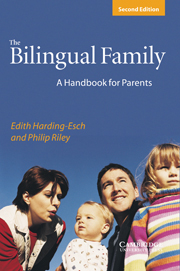Book contents
- Frontmatter
- Contents
- The authors
- Preface
- Part I A survey of the issues
- 1 Children and language
- 2 What is bilingualism?
- 3 Some things you should know about being bilingual
- 4 The development of the bilingual child
- 5 What will influence your decision whether to bring up your children as bilinguals?
- Part II Case studies: a number of bilingual families, and how they did it
- Part III An alphabetical reference guide
- Quotations
- Recommended resources
- Bibliography
- References
- Index
5 - What will influence your decision whether to bring up your children as bilinguals?
Published online by Cambridge University Press: 29 March 2010
- Frontmatter
- Contents
- The authors
- Preface
- Part I A survey of the issues
- 1 Children and language
- 2 What is bilingualism?
- 3 Some things you should know about being bilingual
- 4 The development of the bilingual child
- 5 What will influence your decision whether to bring up your children as bilinguals?
- Part II Case studies: a number of bilingual families, and how they did it
- Part III An alphabetical reference guide
- Quotations
- Recommended resources
- Bibliography
- References
- Index
Summary
QUESTIONS YOU SHOULD ASK YOURSELF
In Chapter 2, we saw that bilingualism exhibits extremely varied patterns throughout the world and that bilingual individuals live in a variety of linguistic situations. This is why the decision to bring children up as bilinguals from birth, or to switch to or add another language later on (during an extended stay abroad, for example) is rarely a clear-cut problem with only a single possible solution. Here are some of the most important factors involved in determining whether or not to go bilingual.
What is your own language background and history?
If they are bilingual themselves, parents are likely to have very strong views on the matter. In our experience, most of them will opt for bilingualism as the only ‘natural’ or ‘sensible’ thing to do. However, it can work both ways: parents whose language recalls a country or a period they wish to reject or forget may decide that they will drop it. This is understandable enough, though it may be a decision that will be greatly regretted by their children and even their grandchildren. Andrea's grandfather escaped from northern Italy early last century to avoid conscription into the Austrian army. In London, he became a leader of the Italian Fascisti. His large and socially mobile family did not bring up a single one of his grandchildren speaking any Italian, one of the reasons being their clear wish to break with such an embarrassing past. (The grandfather was interned, although that was the cause of more anger than shame.) Andrea was brought up in the States but later returned to Europe and spent a year in Italy studying the dialect spoken by her grandparents.
- Type
- Chapter
- Information
- The Bilingual FamilyA Handbook for Parents, pp. 77 - 92Publisher: Cambridge University PressPrint publication year: 2003
- 1
- Cited by



